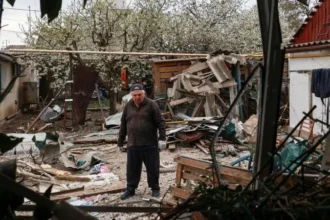Israeli army vehicles had already pounded the dirt road into dust where we crossed into Lebanon, breaking through a hole in the fence that marks the ceasefire line drawn between the two countries a generation ago.
The ceasefire itself is already in tatters.
Israel’s ground invasion along this border last week was launched, it said, to destroy Hezbollah weapons and infrastructure in “limited, localised, targeted raids”.
Ten days on, the army was taking us to a village a couple of miles into Lebanese territory, where it had just established “some level of control”.
We were told not to reveal where it is, for military reasons, and our movements were restricted.
Israeli artillery was blasting through the air as we arrived. The brigade commander, Col Yaniv Malka, told us the area was still not clear of Hezbollah fighters.
Bursts of small-arms fire were from fighting that was taking place 500m away, he said, describing “face-to-face combat” with Hezbollah fighters inside the village just a couple of days before – meaning, he said, “my troops seeing in their eyes, and fighting them in the streets”.
All along the central path through the village, houses lay demolished; piles of rubble leaching glimpses of family life. Buildings left standing were shot through with artillery, missing corners or walls and peppered with gunshot and shrapnel holes.
Two tanks sat in churned up earth near what was once a village square. The level of destruction around them is reminiscent of Gaza.
Our movements on the ground were restricted by the army to a limited area of the village, but neighbouring buildings and communities appeared, from a distance, to be untouched.
These incursions seem – so far – to be more “limited and targeted” geographically than militarily.
The graffiti on a building commandeered by troops read: “We wanted peace, you wanted war”.
“Most of the terrorists ran away,” Col Malka told me. “[But] dozens of houses were booby-trapped. When we went house to house, we discovered booby-traps and weapons. We had no choice but to destroy them.”
We only have the army’s account of what happened here.
I asked an army spokesman whether any women or children were present when the operation here began. He replied that all civilians had been given ample warning to leave.
The human rights group Amnesty International this week described Israel’s evacuation warnings in southern Lebanon as inadequate and overly general, and said they did not absolve the country of its obligations under international law.
We were also shown three caches of weapons it said were found inside civilian homes here, including boxes of brand-new mortars, new anti-tank missiles and mines, as well as sophisticated shoulder launched rockets and night-scopes.
One anti-tank missile we saw was already semi-assembled.


















